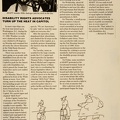USA Today
Friday March 16, 1990 USA Today
USA TODAY hopes to serve as a forum for better understanding and unity to help make the USA truly one nation."
—Allen H. Nouharth, Founder, Sept.15,1982
Peter S. Prichard, Editor John Seigenthaler, Editorial Director
Cathleen Black, Publisher Thomas Curley, President
DEBATE
The USA's disabled deserve simple justice
Jennifer Keelan is an 8-year-old who knows how to get where she wants to go.
Afflicted with cerebral palsy, Jennifer has trouble moving around. But Monday afternoon in Washington, she crawled hand-over-hand up the 83 steps leading to the U.S. Capitol, eventually reaching the top.
No members of Congress threw obstacles in her path.
None stood in her way.
But in the eyes of Jennifer and about 60 others who abandoned their wheelchairs to make the Capitol climb, they might just as well have.
By failing to protect the disabled from discrimination, they say, Congress is allowing others to throw obstacles in their path every day.
They want Congress to stop yakking and start voting on the Americans with Disabilities Act, sweeping legislation that would do for the disabled what the civil rights legislation of the 1960s did for minorities and women.
The legislation passed the Senate last year. It has the support of the president. But the House of Representatives, lobbied hard by business interests that fear the bill's costs, just can't seem to get its part of the job done.
Justice demands that the stalling end.
Today, people in wheelchairs lose job opportunities because they can’t get to work on public transportation.
The deaf are often shut off from society because telephones aren't properly equipped.
People with mental disabilities are denied jobs by employers who wrongly assume they can't do them.
Too often, the only response is: What do they expect? Society can't make them well again.
The disabilities act has a better, more sensitive response:
* lt bans discrimination against both the mentally and physically disabled.
* It requires employers to make “reasonable accommodations" for the handicapped.
* It ensures access to bus and rail systems.
* It mandates full telephone access for the deaf.
* It demands that public accommodations, ranging from hotels to coffee shops to bowling alleys, try to provide equal access for the disabled.
Those goals cannot be achieved easily or cheaply. As you can read across this page, they will mean new costs and inconveniences for businesses.
New equipment may be needed. Structural alterations may be required. Plans for new building may be altered.
Those concerns deserve consideration. But they are not adequate reasons to delay any longer.
The legislation specifies that employers not be forced to endure undue hardship.
It says the only changes that are required are those that are readily achievable.
It affords time to make changes — as long as 30 years in some cases.
Every day that Congress delays is another day that obstacles can be thrown in Jennifer Keelan's path.
And she, just like the rest of us, deserves every opportunity to reach the top.
CARTOON (by David Seavey, USA Today): Little person in an old manual wheelchair on a long scroll of paper with "Access Laws" written on it. Scroll makes a kind of ramp up a set of stairs to a large fancy building that looks like a government building.
QUOTELINES
"What am l required to do if I have three employees with different disabilities and six customers come into my business who are hearing-impaired, all of whom need sign-language interpreters?"
-- Kenneth Lewis, disabled accounting-firm owner
"What we did for civil rights in the '60s. we forgot to do for people with disabilities."
-- Rep. Pat Schroeder, D-Colo.
"Yes. there are costs associated with this bill, but these costs are manageable."
— Rep. Norman Mineta, D-Calif.
“lt will reach the floor, we will have a conference with the Senate, and it will become law."
-— House Speaker Thomas Foley, D-Wash.
- Created on
- Friday 12 July 2013
- Posted on
- Monday 29 June 2015
- Tags
- accessible transit, ADA, cartoon, Congresswoman Pat Schroeder, crawl, deaf, editorial, House Speaker Tom Foley, Jennifer Keelan, mental disabilities, Representative Norman Mineta, wheelchairs
- Albums
- Visits
- 3194
- Rating score
- no rate
- Rate this photo


0 comments